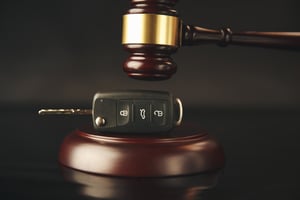 One of people’s biggest concerns when trying to decide whether they should file for bankruptcy is whether they will be able to keep their vehicle or not. After all, it is typically one of the most valuable assets people have and often their sole means of transportation.
One of people’s biggest concerns when trying to decide whether they should file for bankruptcy is whether they will be able to keep their vehicle or not. After all, it is typically one of the most valuable assets people have and often their sole means of transportation.
Chapter 13 bankruptcies allow people to keep their property in exchange for agreeing to a 3-5 year payment plan, in which they make monthly payments towards their debts. Chapter 7 bankruptcies typically last up to 4 months and do not require any payments towards debt. The catch is that any property that is not specifically “exempt,” that is protected under the law, can be taken by the bankruptcy trustee to be sold to pay towards your debts.
Vehicle Worth in Bankruptcy
Vehicles that are worth less than the loan against them cannot be taken by the bankruptcy trustee. Only vehicles that are worth more than the loan on them can be taken to be sold to pay towards your debts. The difference between the vehicle’s value and the amount owed on it is called its equity. Bankruptcy law allows you to choose one vehicle to exempt up to $4,000 or $5,000 in equity (depending on whether you choose Federal or State law exemptions to protect the vehicle). For example, if you owned a car worth $7,000, and had a loan against it for $4,000, the car’s equity would be $3,000. Therefore, it would be fully protected (a.k.a. “exempt”) under both Federal and State law exemption law. The trustee would not be able to take the car for sale and payment to creditors.
Options for Your Vehicle During Bankruptcy
Bankruptcy law allows you to surrender your vehicle, stop making payments, allow the lender to repossess the vehicle and walk away from any remaining loan balance, debt free. It also gives you the option to keep the vehicle by “reaffirming” the debt. Reaffirming the debt is basically acknowledging that you validly owe the debt and that you agree to keep that debt, unlike other debts which are automatically discharged (wiped out) at the end of your bankruptcy case. You will state whether you intend to surrender the vehicle or keep it, and reaffirm the debt, in a form called the Statement of Intent, as part of your bankruptcy petition, filed with the court.
What is a "Reaffirmation Agreement"?
Technically, you are supposed to sign a “reaffirmation agreement” with the car loan lender within a certain time period after filing your bankruptcy case in order to ensure you can keep the vehicle. The reaffirmation agreement guarantees that you can keep the car so long as you remain current on your vehicle payments, in exchange for your agreement to remain legally liable for the remaining loan balance after your bankruptcy case is done. However, in most cases, it’s generally not advisable to sign a reaffirmation agreement. While it’s true that without a signed reaffirmation agreement the lender may legally repossess the vehicle, at any time, even if you are current on your car payments, the vast majority of car loan lenders will not repossess the car as long as you continue making payments.
By signing the reaffirmation agreement, you put yourself at risk for the lender taking legal action against you (i.e. suing you) in the event that you become unable to make payments for the remaining balance of the loan. Whereas, if you don’t sign the agreement, the lender will never be able to take any action against you, other than repossessing the car, should you become unable or unwilling to continue making payments.
CALL NOW FOR A FREE STRATEGY SESSION FROM A MN BANKRUPTCY LAWYER AT KAIN & SCOTT
If you do decide to sign a reaffirmation agreement, it will need to be filed with the court, and it’s subject to court approval. The court will not approve of the agreement if it determines that it will create too much of a financial burden on you to sustain. If you are not represented by an attorney you will have to attend a court hearing, in which the judge will decide whether to approve the agreement. For this reason, and because circumstances very greatly from person to person, you should discuss these things with an experienced bankruptcy attorney, whom can give you the best advice possible. See us anytime at www.kainscott.com.


